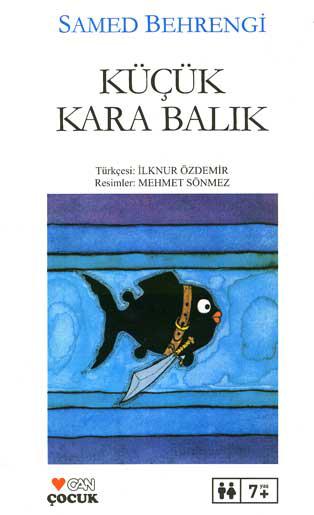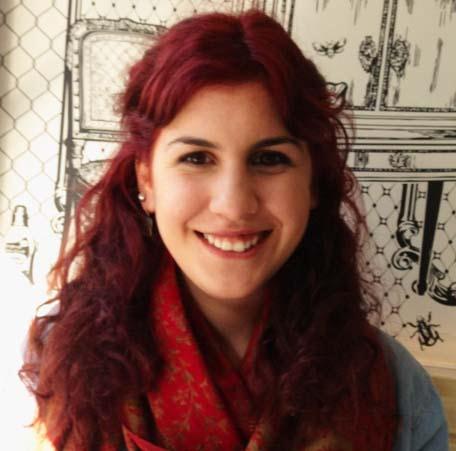The Infection
I have finally found the source of the infection! I often wonder why I am so against being just another sheep in the flock, living all my life in the same city, surrounded by the same people, never improving my understanding of the world. I found the answer to this not-so-easy question, which has been left unanswered by many people including, up to now, myself. At this point, the reader who is familiar with my articles is probably expecting me to move on to literature, the arts or creativity. My latest discovery shall not disappoint them. What showed me that life is worth living so long as you follow your desires and become a greater piece of the whole was nothing more than a Little Black Fish.
 Hearing his name at one of the weekly meetings of the Bilkent University Literature Society was like remembering an old friend. I couldn't help but smile when I was told that he was still alive. Samed Behrengi's young friend used to talk to me through the cassette player before I went to bed. Being younger than ten at the time, all I can remember is that I was always so amazed by this tiny little fish, who had the courage to leave his home to see the ocean. Reading it a few days ago, I was shocked that this was recorded for kids to listen to. Given that they lack the experience and the skills to make the connection between a tale and the reality it is based upon, I tried to find a reason why this story was being presented to children. The conclusion I reached was that the human mind has the ability to store any kind of information. It keeps even the kind that it can't make sense of at that point, knowing that it will be of use one day. I'm almost sure that "The Little Black Fish" has contributed greatly to making me who I am now.
Hearing his name at one of the weekly meetings of the Bilkent University Literature Society was like remembering an old friend. I couldn't help but smile when I was told that he was still alive. Samed Behrengi's young friend used to talk to me through the cassette player before I went to bed. Being younger than ten at the time, all I can remember is that I was always so amazed by this tiny little fish, who had the courage to leave his home to see the ocean. Reading it a few days ago, I was shocked that this was recorded for kids to listen to. Given that they lack the experience and the skills to make the connection between a tale and the reality it is based upon, I tried to find a reason why this story was being presented to children. The conclusion I reached was that the human mind has the ability to store any kind of information. It keeps even the kind that it can't make sense of at that point, knowing that it will be of use one day. I'm almost sure that "The Little Black Fish" has contributed greatly to making me who I am now.
Another point that kept my attention while reading the story was the ending. The amazing thing about children is that they don't believe in endings. No matter how many times they listen to a story, they keep getting as excited as the last time they heard the exact same story. I don't even remember how many times I made my father tell me the story of the lying shepherd, and my amazement in finding out that not even once did the villagers help the little boy. But what is so inviting about "The Little Black Fish" is that it doesn't have an ending. It finishes with the grandma fish saying that since that day, no one has ever seen the little fish; and a red fish keeps thinking about what happened to him. So the reader is left to come up with whatever ending he pleases. Little children are often like the red fish, and in that hazy moment when their eyes are closing, they think about what happened to the Little Black Fish. And in their dreams, they swim through the mighty ocean with the thirst for life they have borrowed from their little friend.
Pondering upon "The Little Black Fish" made me realize that imagination has a greater power than what is generally accorded to it. Unfortunately, this power is sometimes recognized by those who don't have the slightest intention of nurturing people who can dream and make their dreams come true. Another book that came up for discussion by the Literature Society was "My Sweet Orange Tree" by Jose Mauro De Vasconcelos: a book that was banned in schools because it was against "Turkish traditions." No matter how hard I looked, I couldn't see anything counter to our traditions in the story of a boy who finds happiness in his friendship with an orange tree and is forced to experience the bitter taste of life at a very early age.
Although I had been planning to write on this topic a long while ago, for some reason I postponed it. However, after last week's April 23rd celebrations, I couldn't help but realize how much has changed since I was a child. If not for any other reason, I regret the passage of those days because back then, we were allowed to spend blessed time with works of literature, our friends, with the advantage of having a governing body more concerned with the development of a child as a person, rather than as someone who should be valued only because he is a part of society. After spending some time with beloved characters from my childhood, I felt lucky that I had had them as friends. And suddenly, I feared for tomorrow.
